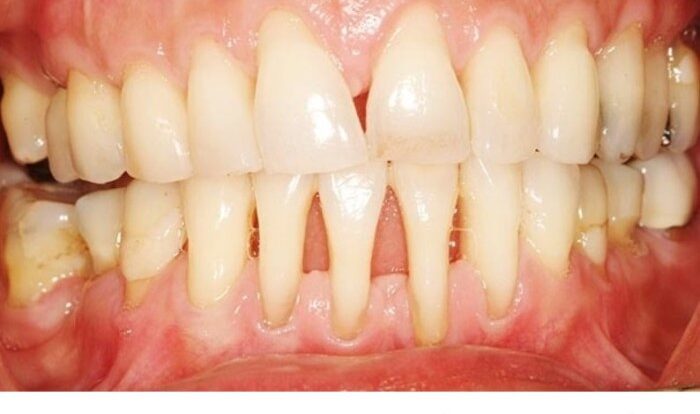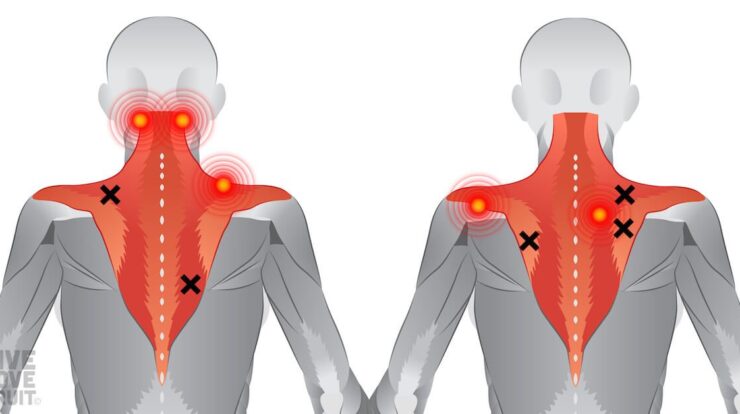
How to cure gum disease without a dentist – Discover how to effectively tackle gum disease without relying on a dentist’s intervention. This guide provides a comprehensive overview of home remedies, over-the-counter treatments, prescription medications, surgical procedures, and lifestyle modifications that can help you restore and maintain healthy gums.
From natural solutions like salt water rinses and tea tree oil to prescription antibiotics and advanced surgical techniques, this guide empowers you with the knowledge and tools to address gum disease effectively.
Home Remedies and Natural Treatments

Gum disease, also known as periodontal disease, is a common oral health problem that can lead to serious health issues if left untreated. While it’s always best to consult a dentist for proper diagnosis and treatment, there are some home remedies and natural treatments that can help alleviate symptoms and support oral health.
It’s important to note that these home remedies are not a substitute for professional dental care and should be used in conjunction with regular dental checkups and cleanings. Additionally, it’s crucial to maintain good oral hygiene practices, such as brushing and flossing regularly, to prevent and manage gum disease.
Salt Water Rinses
Salt water rinses are a simple and effective way to reduce inflammation and kill bacteria in the mouth. To make a salt water rinse, dissolve half a teaspoon of salt in a cup of warm water. Rinse your mouth with the solution for 30 seconds, then spit it out.
Repeat several times a day.
Gum disease is a common problem that can lead to serious health issues if left untreated. While it’s best to see a dentist for professional treatment, there are some things you can do at home to help cure gum disease without a dentist.
For more information on how to cure gum disease without a dentist, check out this article . This article provides detailed instructions on how to cure gum disease without a dentist, including natural remedies and lifestyle changes.
Gum disease can be a real pain in the mouth, but there are ways to cure it without having to go to the dentist. If you’re looking for a natural way to cure gum disease, there are a few things you can try.
Click here to know more about curing gum disease without a dentist.
Benefits:Salt water rinses help reduce swelling, kill bacteria, and promote healing.
Limitations:Salt water rinses can be irritating to some people, especially if used too frequently.
Tea Tree Oil
Tea tree oil is a natural antiseptic and antibacterial agent that can help fight gum disease. To use tea tree oil for gum disease, add a few drops to a cup of water and rinse your mouth for 30 seconds.
Repeat several times a day.
Benefits:Tea tree oil helps kill bacteria, reduce inflammation, and promote healing.
Limitations:Tea tree oil can be toxic if swallowed, so it’s important to use it only as directed. It can also cause skin irritation in some people.
Turmeric
Turmeric is a spice that has anti-inflammatory and antibacterial properties. To use turmeric for gum disease, mix a teaspoon of turmeric powder with a little water to form a paste. Apply the paste to your gums and leave it on for 10-15 minutes, then rinse your mouth with water.
Benefits:Turmeric helps reduce inflammation, kill bacteria, and promote healing.
Limitations:Turmeric can stain your teeth and gums, so it’s important to rinse your mouth thoroughly after use.
Over-the-Counter Treatments
Over-the-counter treatments can help reduce inflammation and kill bacteria in the mouth, which can help improve gum health. These treatments are available in a variety of forms, including mouthwashes, gels, and toothpastes.
Types of Over-the-Counter Mouthwashes
There are two main types of over-the-counter mouthwashes: antiseptic mouthwashes and fluoride mouthwashes.
- Antiseptic mouthwashescontain ingredients that kill bacteria in the mouth. These ingredients include chlorhexidine, cetylpyridinium chloride, and essential oils.
- Fluoride mouthwashescontain fluoride, which helps strengthen teeth and prevent cavities. Fluoride can also help reduce inflammation in the gums.
Types of Over-the-Counter Gels
Over-the-counter gels are typically applied directly to the gums. These gels contain ingredients that can help reduce inflammation and kill bacteria.
Gum disease is a common problem that can lead to serious health issues if left untreated. Fortunately, there are a number of things you can do to cure gum disease without a dentist, including practicing good oral hygiene, eating a healthy diet, and taking certain supplements.
For more information on how to cure gum disease without a dentist, visit this website .
- Antiseptic gelscontain ingredients that kill bacteria in the mouth. These ingredients include chlorhexidine and cetylpyridinium chloride.
- Fluoride gelscontain fluoride, which helps strengthen teeth and prevent cavities. Fluoride can also help reduce inflammation in the gums.
Effectiveness and Side Effects of Over-the-Counter Treatments
The effectiveness of over-the-counter treatments for gum disease varies depending on the product. Some products are more effective than others, and some people may experience side effects from using these products.
| Product | Effectiveness | Side Effects |
|---|---|---|
| Chlorhexidine mouthwash | Effective at reducing plaque and gingivitis | Can cause tooth staining and taste disturbances |
| Cetylpyridinium chloride mouthwash | Effective at reducing plaque and gingivitis | Can cause tooth staining and taste disturbances |
| Fluoride mouthwash | Effective at preventing cavities and reducing inflammation | Can cause tooth staining and taste disturbances |
| Antiseptic gel | Effective at reducing plaque and gingivitis | Can cause tooth staining and taste disturbances |
| Fluoride gel | Effective at preventing cavities and reducing inflammation | Can cause tooth staining and taste disturbances |
Prescription Medications
Prescription medications are a crucial component of treating gum disease when home remedies and over-the-counter treatments prove ineffective. These medications target specific aspects of the disease process, offering a more potent approach to controlling inflammation, eliminating bacteria, and promoting healing.
Antibiotics
Antibiotics are the mainstay of prescription medications for gum disease. They combat bacterial infections by either killing or inhibiting the growth of harmful bacteria. Commonly prescribed antibiotics include amoxicillin, metronidazole, and doxycycline.
Anti-inflammatory Medications
Anti-inflammatory medications reduce inflammation, a primary cause of gum disease symptoms. Nonsteroidal anti-inflammatory drugs (NSAIDs), such as ibuprofen and naproxen, are commonly used to alleviate pain, swelling, and redness.
Antiseptic Mouthwashes
Antiseptic mouthwashes contain ingredients that kill bacteria and reduce inflammation. They are used as an adjunct to brushing and flossing to enhance oral hygiene and control gum disease.
Other Medications
Other medications may be prescribed depending on the severity and underlying cause of gum disease. These include:
- Bone grafts to repair damaged bone tissue
- Growth factors to promote tissue regeneration
- Immunosuppressants to reduce inflammation in severe cases
Potential Side Effects and Interactions
Prescription medications for gum disease can have potential side effects, including nausea, diarrhea, and allergic reactions. It is crucial to follow the prescribed dosage and consult a healthcare professional for any adverse effects. Additionally, interactions with other medications should be considered, especially blood thinners and anticoagulants.
You’ll find that gum disease is a common problem, and if you’re like me, you might be wondering how to cure gum disease without a dentist. Luckily, there are many ways to cure gum disease without a dentist. If you’re interested in learning how to cure gum disease without a dentist, check out how to cure gum disease without a dentist for more info on how to cure gum disease without a dentist.
Surgical Procedures

When non-surgical treatments fail to resolve gum disease, surgical procedures may be necessary to restore periodontal health and prevent further damage. Surgical options vary depending on the severity and location of the disease.
Flap Surgery
Flap surgery involves lifting the gum tissue away from the teeth to access and remove tartar and bacteria below the gum line. This procedure is typically performed on areas with deep pockets or advanced gum recession. The gum tissue is then repositioned and sutured back into place, allowing it to heal and reattach to the teeth.
Bone Grafting
Bone grafting is used to regenerate lost bone tissue due to severe gum disease. The procedure involves placing bone material, either natural or synthetic, into the affected area to promote bone growth and support the teeth. Bone grafting can help stabilize loose teeth and prevent further bone loss.
Guided Tissue Regeneration (GTR)
GTR is a technique used to encourage the growth of new periodontal tissue. A membrane is placed between the gum tissue and the bone to create a space where new bone and tissue can develop. GTR is often used in conjunction with flap surgery or bone grafting.
Soft Tissue Grafting, How to cure gum disease without a dentist
Soft tissue grafting is used to cover exposed tooth roots or reinforce thin gum tissue. The procedure involves taking a small piece of tissue from the palate or another donor site and grafting it onto the affected area. This helps protect the roots from decay and improves the aesthetics of the smile.
Lifestyle Modifications

Maintaining a healthy lifestyle is crucial for preventing and managing gum disease. Lifestyle modifications, such as smoking cessation, stress management, and adopting a balanced diet, play a significant role in preserving gum health.
Smoking Cessation
Smoking damages the immune system, making the body more susceptible to gum disease. Quitting smoking improves blood flow to the gums, allowing them to heal and fight infection.
Stress Management
Chronic stress can weaken the immune system, increasing the risk of gum disease. Engaging in stress-reducing activities like yoga, meditation, or spending time in nature can help manage stress and support gum health.
Healthy Diet
A healthy diet rich in fruits, vegetables, and whole grains provides essential nutrients for gum health. Foods high in vitamin C, such as citrus fruits, help strengthen the immune system and support collagen production, which is crucial for healthy gums.
Limiting sugary foods and drinks helps prevent plaque formation and reduces the risk of gum disease.
Final Wrap-Up
By following the strategies Artikeld in this guide, you can proactively prevent and manage gum disease, ensuring a healthy and radiant smile. Remember, maintaining good oral hygiene is paramount, and if symptoms persist or worsen, it’s always advisable to seek professional dental care.
FAQ Section: How To Cure Gum Disease Without A Dentist
Can I completely cure gum disease at home?
While home remedies and lifestyle changes can improve gum health, severe cases of gum disease may require professional dental intervention.
Are over-the-counter mouthwashes effective against gum disease?
Over-the-counter mouthwashes can help reduce plaque and bacteria, but they are not a substitute for professional dental care and may not be effective for advanced gum disease.
When should I consider prescription medications for gum disease?
Prescription medications may be necessary if home remedies and over-the-counter treatments fail to control gum disease or if the infection has spread to the bone.




